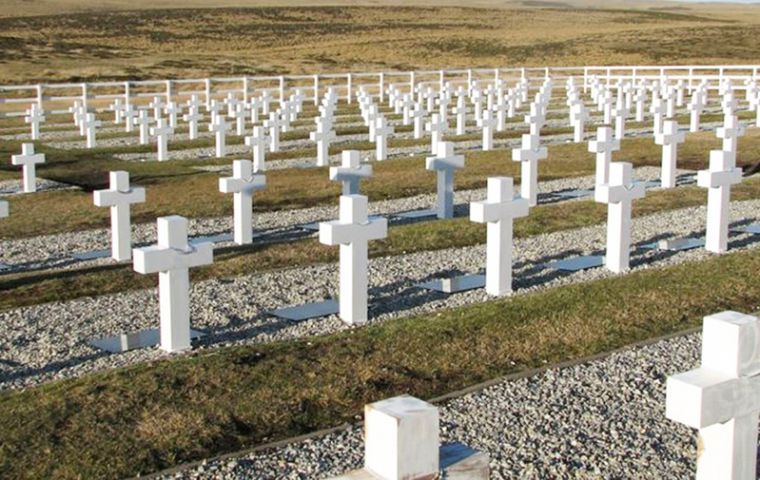MercoPress. South Atlantic News Agency
Identification Plan of Argentine remains in the Falklands to be extended
 The Argentine military cemetery at Darwin where the successful identification of 106 remains has been concluded, and now have a full name
The Argentine military cemetery at Darwin where the successful identification of 106 remains has been concluded, and now have a full name Argentina and the United Kingdom are to discuss the extension of the current Humanitarian Project Plan to identify Argentine combatant remains buried in the Falkland Islands, to include possible errors in the names of some graves, and other burial sites such as Pebbles island, according to a report from Martin Dinatale published in the news agency Infobae.
The very successful Plan, under the guidance of the International Commission of the Red Cross, has allowed so far to identify 106 remains at the Argentine military cemetery in Darwin, out of a total of 121/122 unnamed graves with the only inscription, “Argentine soldier, only known to God”.
Dinatale anticipates that discussions, led by ambassadors in London and Buenos Aires, Carlos Sersale Di Cerisano and Mark Kent, will also need the consent from relatives of the Malvinas families and the Falkland Islands government, as has been the case in this first successful chapter.
Although formal discussions have yet to begin, both the Argentine government and the Foreign Office see no substantial problems to an annex of the current Plan, “since it is a humanitarian project”, supported by all sides.
Apparently and according to the Argentine Human Rights Secretary, Claudio Avruj, an Argentine historian claims a grave apparently had remains of four combatants and there could be involuntary problems with names of soldiers killed in different battles and dates.
In effect during the remodeling of the Argentine military cemetery in 2004, there was some confusion when the old white crosses were replaced by new ones and the black granite gravestones were added, and some of the tombs ended “wrongly identified” as was later proven with three names.
Likewise there are unidentified tombs of Argentine combatants in Pebble Island, where British special forces raided a landing strip destroying some twelve Argentine aircraft.
“Work so far and which has been praised in the world, showed what has been the most important and that is, after 36 years, that families know where their beloved rest, our Malvinas heroes. And also underlines Humanitarian Law which has helped us all with this expression of love. That is the path we have chosen and hope to conclude, with the identification of all remains”, said Human Rights Secretary Avruj, quoted by Dinatale




Top Comments
Disclaimer & comment rulesCommenting for this story is now closed.
If you have a Facebook account, become a fan and comment on our Facebook Page!